Related Research Articles

Ghantasala Venkateswararao, known mononymously by his surname as Ghantasala, was an Indian playback singer and film composer known for his works predominantly in Telugu and Kannada cinema and also in Tamil, Malayalam, Tulu and Hindi language films. He is considered one of the greatest singers of Telugu cinema. In 1970, he received the Padma Shri award, India's fourth highest civilian award for his contribution to Indian cinema. According to The Hindu and The Indian Express, Ghantasala was 'such a divine talent and with his songs he could move the hearts of the people'. 'Ghantasala's blending of classical improvisations to the art of light music combined with his virtuosity and sensitivity puts him a class apart, above all others in the field of playback singing'. Gifted with what Indian film historian V. A. K. Ranga Rao called 'the most majestic voice', Ghantasala helped Telugu film music develop its own distinct character which remains unparalleled. He is referred to as the 'Gaana Gandharva' for his mesmerising voice and musical skills.
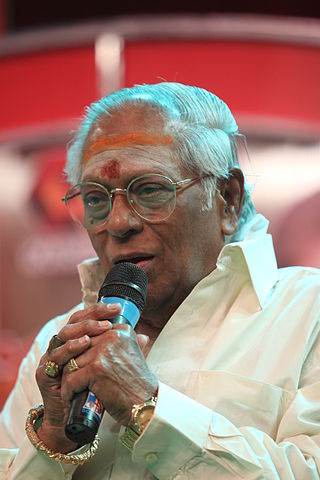
Manayangath Subramanian Viswanathan, also known as M.S.V., was an Indian music director, singer and actor who predominantly worked in Tamil film industry. Popularly known by the sobriquet "Mellisai Mannar", he composed songs for more than 800 Indian films and various albums across languages primarily in Tamil, Malayalam and Telugu films. He has also acted and sung in a few Tamil films. The Chief Minister of Tamil Nadu J Jayalalithaa conferred the "Thirai Isai Chakravarthy" title on him in August 2012 and presented him with 60 gold coins and a new car.

Amrithakadeeswarar Abhirami Temple (also called Abhirami temple is a Hindu temple dedicated to Shiva in his manifestation as Kalantaka and his wife Parvati as Abhirami. There is a Shrine for Maha Vishnu as Amrithanarayana and his consort Mahalakshmi as Amrithavalli. It is located in Thirukkadaiyur, 21 km East of Mayiladuthurai, Tamil Nadu in India. This temple is associated with the legend of Shiva saving his young devotee, Markendeya from death, and the tale of a saint, Abirami Pattar a devotee of the presiding goddess.
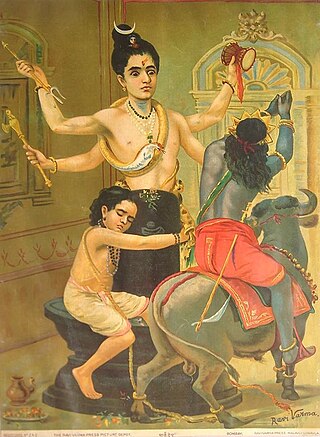
Markandeya is a rishi (sage) featured in Hindu literature. He is the son of the sage Mrikanda and his wife, Manasvini. The Markandeya Purana, attributed to the sage, comprises a dialogue between Markandeya and a sage called Jaimini. A number of chapters in the Bhagavata Purana are dedicated to his conversations and prayers. He is also mentioned in the Mahabharata. Markandeya is venerated within all mainstream Hindu traditions.
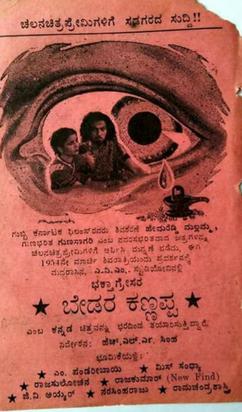
Bedara Kannappa is a 1954 Indian Kannada-language Hindu mythological film directed by H. L. N. Simha and written by G. V. Iyer. The film stars Rajkumar playing the title character along with Pandari Bai, Kushala Kumari, G. V. Iyer, Sandhya and Narasimharaju in other prominent roles. The film is an adaptation of the stage play Kaalahasti Charitre written by T. N. Balakrishna for the Gubbi Veeranna Nataka Company, which was based on the folk tale of the hunter Kannappa who proves his extreme devotion to the Hindu God Shiva by gouging out both his eyes.

Gurusala Krishnadas Venkatesh was an Indian film score composer who primarily worked in Kannada cinema during the 1960s, 1970s and until the late-1980s. He also composed music for Telugu, Malayalam and Tamil films. He produced numerous master pieces of Kannada film music and also brought in Western background score into Kannada films and scored music for all Bond movies of Rajkumar in the 1960s to 1970s.
The Markandeshwar Mahadev temple is a Shiva temple, located in the town of Shahabad Markanda, which is situated in the Kurukshetra district of Haryana in North India. The name Markandeshwar is associated with Maharishi Markandeya, a great devotee of Shiva.
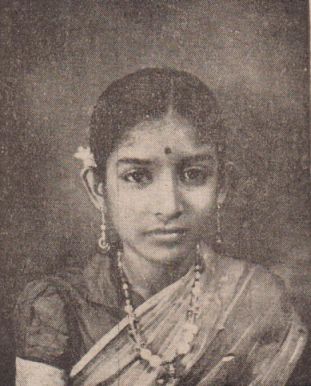
Pillavalu Gajapathy Krishnaveni, more famously known as Jikki, was an Indian playback singer from Andhra Pradesh. She sang around 10,000 songs in Telugu, Tamil, Kannada, Malayalam, Sinhalese, and Hindi languages.
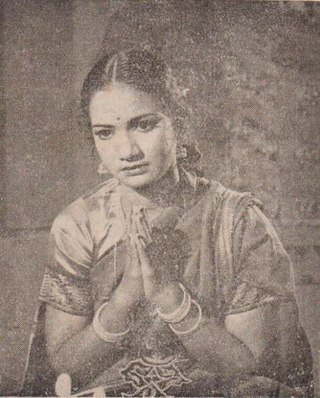
Raavu Balasaraswathi Devi is an Indian singer and actress who performed from 1930 to the 1960s in Telugu and Tamil cinema. She was the first light music singer on All India Radio and the first playback singer in the Telugu cinema.
Chitrapu Narayana Rao was an Indian film director and producer known for his works in Telugu and Tamil cinema. He received a Certificate of Merit for the Third Best Tamil Film for Edhir Paradhathu (1958) and Annaiyin Aanai (1962). He also won the Nandi Award for the 1967 Telugu film Bhakta Prahlada.

Kalantaka is an aspect of the Hindu god Shiva as the conqueror of time and death, itself personified by the god Yama. He is depicted as defeating or killing Yama when the latter comes to take the life of Shiva's devotee Markandeya. Shiva is often depicted as dancing on death, personified by Yama.

Thirukkadaiyur (Thirukadavur) is a village on the east coast of Tamil Nadu, about 300 km south of Chennai and 15 km north of Karaikal. The history of the village is associated with the legends of Markandeya and Abirami Pattar. The village is centered around Amritaghateswarar - Abirami Temple of Tirukkadaiyur, a replica. The original temple, Thirumeignanam Gnanaparameswarar Temple, called Thirumeignanam, built in the 11th century, was ravaged by the sea, and is in ruins now. People worship and pray at Thirukkadaiyur temple to have a longer life.
Viswanathan–Ramamoorthy were an Indian music composing duo composed of M. S. Viswanathan and T. K. Ramamoorthy. They worked together on over 100 films, from 1952's Panam to 1965's Aayirathil Oruvan. After their split, Ramamoorthy worked on 16 films between 1966 and 1986. He and Viswanathan reunited in 1995 for Engirundho Vandhan.
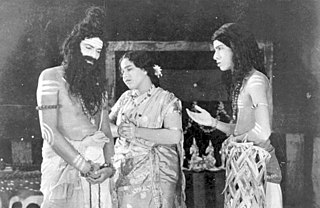
Markandeya is a 1935 Tamil film directed by K. Ramnoth and Murugadasa. The film is based on the mythological story of Markandeya.
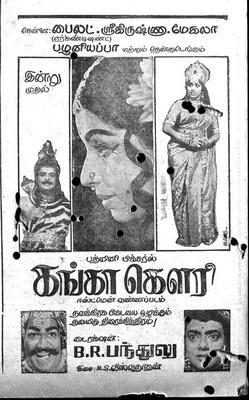
Ganga Gowri is a 1973 Indian Tamil-language Hindu mythological film, directed and produced by B. R. Panthulu. The film stars Gemini Ganesan and Jayalalithaa & Jayanthi with music composed by M. S. Viswanathan. It is a remake of Panthulu's own 1967 Kannada film Gange Gowri. The film was released on 16 January 1973, and emerged a commercial success.
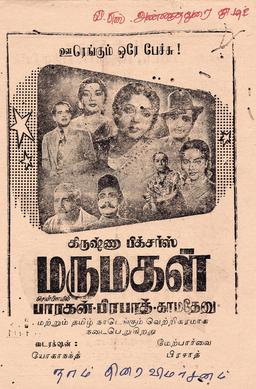
Marumagal (transl. Daughter-in-law) is a 1953 Indian Tamil-language drama film, produced by Lena Chettiar on Krishna Pictures banner and directed by D. Yoganand. The film stars N. T. Rama Rao, Padmini and Lalitha, with music composed by C. R. Subburaman. It was simultaneously shot in Telugu-language as Ammalakkalu.

Kalai Kovil is a 1964 Indian Tamil-language musical film written and directed by C. V. Sridhar. The film stars S. V. Subbaiah, R. Muthuraman, Chandrakantha and Rajasree, with Nagesh, V. Gopalakrishnan, V. S. Raghavan, Jayanthi and S. N. Lakshmi in supporting roles. It focuses on the rags to riches story of a veena vidwan, whose success is almost derailed when he takes to liquor abuse.
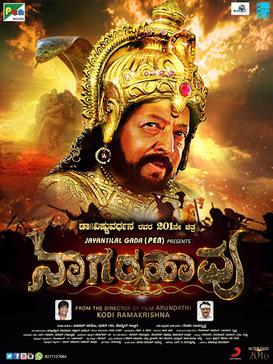
Nagarahavu (transl. Cobra) is a 2016 Indian Kannada language epic fantasy film directed by Kodi Ramakrishna, the final film directed by him before his death in 2019, and produced by Sajid Qureshi, Inbox Pictures Pvt Ltd.
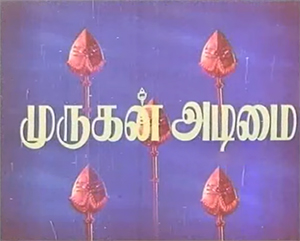
Murugan Adimai is a 1977 Indian Tamil-language devotional film starring R. Muthuraman, A. V. M. Rajan, K. R. Vijaya in lead roles with Nagesh, Major Sundarrajan and Thengai Srinivasan in supporting roles. The film was directed by R. Thyagarajan and released on 25 March 1977.
Shiv Bhakta also spelt as Shiv-Bhakta is a 1955 Hindu epic film directed by H.L.N. Simha starring Shahu Modak and Padmini in lead roles. It was a mythological film produced by AVM productions and it was directed by H. L. N. Simha with music by Chitrgupta. The songs were penned by Gopal Singh Nepali. Songs were considered evergreen. There are excellent classical dances by Padmini in this film. This was Padmini's second Hindi film followed by Mr. Sampat (1952). The film is a remake of director - producer duo's 1954 Kannada film Bedara Kannappa. This Kannada movie was Kannada superstar Dr Rajkumar's first as a hero.
References
- ↑ "1957 – பக்த மார்க்கண்டேயா". Lakshman Sruthi (in Tamil). Archived from the original on 11 October 2016. Retrieved 10 October 2016.
- ↑ "விக்ரம் ஸ்டூடியோவில் உருவான 'பக்த மார்க்கண்டேயா'!". Hindu Tamil Thisai (in Tamil). 2 January 2024. Archived from the original on 22 September 2024. Retrieved 22 September 2024.
- ↑ M, Marimuthu (2 January 2024). "67 years of Bhakta Markandeya: 16 வயது சிறுவனின் மெச்ச வைத்த சிவபக்தி.. நீண்ட ஆயுளைப்பெற்ற மார்க்கண்டேயரின் கதை!". Hindustan Times (in Tamil). Archived from the original on 22 September 2024. Retrieved 22 September 2024.
- ↑ Neelamegam, G. (December 2014). Thiraikalanjiyam — Part 1 (in Tamil) (1st ed.). Chennai: Manivasagar Publishers. p. 127.